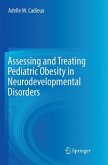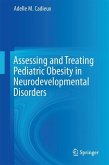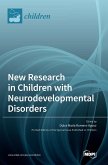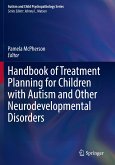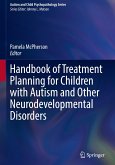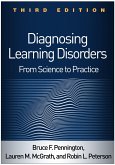Neil Nicoll
Assessing and Diagnosing Young Children with Neurodevelopmental Disorders
A DSM-5-TR Compliant Guide
Neil Nicoll
Assessing and Diagnosing Young Children with Neurodevelopmental Disorders
A DSM-5-TR Compliant Guide
- Gebundenes Buch
- Merkliste
- Auf die Merkliste
- Bewerten Bewerten
- Teilen
- Produkt teilen
- Produkterinnerung
- Produkterinnerung
This practical handbook assesses global developmental delay and other neurodevelopmental disorders in young children. The new edition incorporates the transition from DSM 5 to DSM-5-TR and has an increased emphasis on cross-cultural and ethnic diversity aspects of assessing and diagnosing neurodevelopmental disorders in young children.
Andere Kunden interessierten sich auch für
![Assessing and Treating Pediatric Obesity in Neurodevelopmental Disorders Assessing and Treating Pediatric Obesity in Neurodevelopmental Disorders]() Adelle M. CadieuxAssessing and Treating Pediatric Obesity in Neurodevelopmental Disorders39,99 €
Adelle M. CadieuxAssessing and Treating Pediatric Obesity in Neurodevelopmental Disorders39,99 €![Assessing and Treating Pediatric Obesity in Neurodevelopmental Disorders Assessing and Treating Pediatric Obesity in Neurodevelopmental Disorders]() Adelle M. CadieuxAssessing and Treating Pediatric Obesity in Neurodevelopmental Disorders39,99 €
Adelle M. CadieuxAssessing and Treating Pediatric Obesity in Neurodevelopmental Disorders39,99 €![New Research in Children with Neurodevelopmental Disorders New Research in Children with Neurodevelopmental Disorders]() New Research in Children with Neurodevelopmental Disorders78,99 €
New Research in Children with Neurodevelopmental Disorders78,99 €![Handbook of Treatment Planning for Children with Autism and Other Neurodevelopmental Disorders Handbook of Treatment Planning for Children with Autism and Other Neurodevelopmental Disorders]() Handbook of Treatment Planning for Children with Autism and Other Neurodevelopmental Disorders154,99 €
Handbook of Treatment Planning for Children with Autism and Other Neurodevelopmental Disorders154,99 €![Handbook of Treatment Planning for Children with Autism and Other Neurodevelopmental Disorders Handbook of Treatment Planning for Children with Autism and Other Neurodevelopmental Disorders]() Handbook of Treatment Planning for Children with Autism and Other Neurodevelopmental Disorders161,99 €
Handbook of Treatment Planning for Children with Autism and Other Neurodevelopmental Disorders161,99 €![Caring for Children With Neurodevelopmental Disabilities and Their Families Caring for Children With Neurodevelopmental Disabilities and Their Families]() Caring for Children With Neurodevelopmental Disabilities and Their Families189,99 €
Caring for Children With Neurodevelopmental Disabilities and Their Families189,99 €![Diagnosing Learning Disorders Diagnosing Learning Disorders]() Bruce F PenningtonDiagnosing Learning Disorders80,99 €
Bruce F PenningtonDiagnosing Learning Disorders80,99 €-
-
-
This practical handbook assesses global developmental delay and other neurodevelopmental disorders in young children. The new edition incorporates the transition from DSM 5 to DSM-5-TR and has an increased emphasis on cross-cultural and ethnic diversity aspects of assessing and diagnosing neurodevelopmental disorders in young children.
Hinweis: Dieser Artikel kann nur an eine deutsche Lieferadresse ausgeliefert werden.
Hinweis: Dieser Artikel kann nur an eine deutsche Lieferadresse ausgeliefert werden.
Produktdetails
- Produktdetails
- Verlag: Taylor & Francis Ltd
- 2. Auflage
- Seitenzahl: 356
- Erscheinungstermin: 9. April 2025
- Englisch
- Abmessung: 246mm x 174mm
- ISBN-13: 9781032933115
- ISBN-10: 1032933119
- Artikelnr.: 71954484
- Herstellerkennzeichnung
- Libri GmbH
- Europaallee 1
- 36244 Bad Hersfeld
- gpsr@libri.de
- Verlag: Taylor & Francis Ltd
- 2. Auflage
- Seitenzahl: 356
- Erscheinungstermin: 9. April 2025
- Englisch
- Abmessung: 246mm x 174mm
- ISBN-13: 9781032933115
- ISBN-10: 1032933119
- Artikelnr.: 71954484
- Herstellerkennzeichnung
- Libri GmbH
- Europaallee 1
- 36244 Bad Hersfeld
- gpsr@libri.de
Neil Nicoll is a Fellow of the Australian Psychological Society College of Educational and Developmental Psychologists, providing services for children with developmental delays and disorders, training programmes for psychologists and paediatricians, and presentations at international conferences.
Part I: Historical overview of neurodevelopmental disorders in young
children 1. Historical overview of neurodevelopmental disorders in young
children 2. What is a neurodevelopmental disorder? 3. Genetic and
chromosomal disorders 4. Selected genetic and chromosomal disorders 5.
Population demographics Part II: Why do we assess and diagnose
neurodevelopmental disorders? 6. Why do we assess young children? 7.
Parental experience of assessment and diagnosis 8. Systemic reasons to
assess and diagnose childhood disorders Part III: The assessment and
diagnostic process 9. Psychometric assessment of childhood development 10.
The Griffiths scales of mental development 11. Bayley scales of infant and
child development 12. Mullen scales of early learning (Eileen M. Mullen)
13. Other notable assessments for young children: the McCarthy scales and
the Miller scales 14. Checklist and questionnaire-based assessments 15.
Cross-cultural adaptations of developmental assessments 16. Assessing
autism spectrum disorder in young children 17. Cross-cultural assessment
and diagnosis of autism spectrum disorder PART IV: From theory to practice
18. From theory to clinical practice 19. Pre-assessment preparation 20. The
assessment process 21. "Driving" the test: the 75-25 rule and its
application 22. Remote and online assessments 23. Scoring developmental
tests 24. Giving feedback 25. Intervention strategies 26. Diagnostic
considerations and formulation PART V: Report writing and case studies 27.
Report writing 28. Case studies and reports PART VI: Follow-up 29.
Follow-up and support Part VII: Pondering the future 30. Pondering the
future of neurodevelopmental disorders
children 1. Historical overview of neurodevelopmental disorders in young
children 2. What is a neurodevelopmental disorder? 3. Genetic and
chromosomal disorders 4. Selected genetic and chromosomal disorders 5.
Population demographics Part II: Why do we assess and diagnose
neurodevelopmental disorders? 6. Why do we assess young children? 7.
Parental experience of assessment and diagnosis 8. Systemic reasons to
assess and diagnose childhood disorders Part III: The assessment and
diagnostic process 9. Psychometric assessment of childhood development 10.
The Griffiths scales of mental development 11. Bayley scales of infant and
child development 12. Mullen scales of early learning (Eileen M. Mullen)
13. Other notable assessments for young children: the McCarthy scales and
the Miller scales 14. Checklist and questionnaire-based assessments 15.
Cross-cultural adaptations of developmental assessments 16. Assessing
autism spectrum disorder in young children 17. Cross-cultural assessment
and diagnosis of autism spectrum disorder PART IV: From theory to practice
18. From theory to clinical practice 19. Pre-assessment preparation 20. The
assessment process 21. "Driving" the test: the 75-25 rule and its
application 22. Remote and online assessments 23. Scoring developmental
tests 24. Giving feedback 25. Intervention strategies 26. Diagnostic
considerations and formulation PART V: Report writing and case studies 27.
Report writing 28. Case studies and reports PART VI: Follow-up 29.
Follow-up and support Part VII: Pondering the future 30. Pondering the
future of neurodevelopmental disorders
Part I: Historical overview of neurodevelopmental disorders in young
children 1. Historical overview of neurodevelopmental disorders in young
children 2. What is a neurodevelopmental disorder? 3. Genetic and
chromosomal disorders 4. Selected genetic and chromosomal disorders 5.
Population demographics Part II: Why do we assess and diagnose
neurodevelopmental disorders? 6. Why do we assess young children? 7.
Parental experience of assessment and diagnosis 8. Systemic reasons to
assess and diagnose childhood disorders Part III: The assessment and
diagnostic process 9. Psychometric assessment of childhood development 10.
The Griffiths scales of mental development 11. Bayley scales of infant and
child development 12. Mullen scales of early learning (Eileen M. Mullen)
13. Other notable assessments for young children: the McCarthy scales and
the Miller scales 14. Checklist and questionnaire-based assessments 15.
Cross-cultural adaptations of developmental assessments 16. Assessing
autism spectrum disorder in young children 17. Cross-cultural assessment
and diagnosis of autism spectrum disorder PART IV: From theory to practice
18. From theory to clinical practice 19. Pre-assessment preparation 20. The
assessment process 21. "Driving" the test: the 75-25 rule and its
application 22. Remote and online assessments 23. Scoring developmental
tests 24. Giving feedback 25. Intervention strategies 26. Diagnostic
considerations and formulation PART V: Report writing and case studies 27.
Report writing 28. Case studies and reports PART VI: Follow-up 29.
Follow-up and support Part VII: Pondering the future 30. Pondering the
future of neurodevelopmental disorders
children 1. Historical overview of neurodevelopmental disorders in young
children 2. What is a neurodevelopmental disorder? 3. Genetic and
chromosomal disorders 4. Selected genetic and chromosomal disorders 5.
Population demographics Part II: Why do we assess and diagnose
neurodevelopmental disorders? 6. Why do we assess young children? 7.
Parental experience of assessment and diagnosis 8. Systemic reasons to
assess and diagnose childhood disorders Part III: The assessment and
diagnostic process 9. Psychometric assessment of childhood development 10.
The Griffiths scales of mental development 11. Bayley scales of infant and
child development 12. Mullen scales of early learning (Eileen M. Mullen)
13. Other notable assessments for young children: the McCarthy scales and
the Miller scales 14. Checklist and questionnaire-based assessments 15.
Cross-cultural adaptations of developmental assessments 16. Assessing
autism spectrum disorder in young children 17. Cross-cultural assessment
and diagnosis of autism spectrum disorder PART IV: From theory to practice
18. From theory to clinical practice 19. Pre-assessment preparation 20. The
assessment process 21. "Driving" the test: the 75-25 rule and its
application 22. Remote and online assessments 23. Scoring developmental
tests 24. Giving feedback 25. Intervention strategies 26. Diagnostic
considerations and formulation PART V: Report writing and case studies 27.
Report writing 28. Case studies and reports PART VI: Follow-up 29.
Follow-up and support Part VII: Pondering the future 30. Pondering the
future of neurodevelopmental disorders


